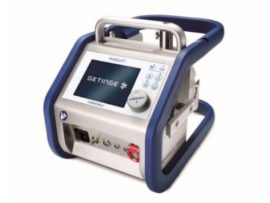Abstract Aim A typical adult based bivalirudin regimen during cardiopulmonary bypass uses a loading dose of 1 mg.kg‐1 and a circuit prime (volume L x 13 mg) with a subsequent intravenous..
Read MoreAbstract Systemic anticoagulation is a standard of care in adult patients supported by extracorporeal membrane oxygenation (ECMO) to prevent circuit thrombosis and subsequent thromboembolic events. Unfractionated heparin has long been..
Read MoreAbstract Objectives: Extracorporeal membrane oxygenation is a life-sustaining therapy for severe respiratory failure. Extracorporeal membrane oxygenation circuits require systemic anticoagulation that creates a delicate balance between circuit-related thrombosis and bleeding-related..
Read MoreAbstract OBJECTIVES Heparin-induced thrombocytopenia (HIT) requires alternative anticoagulation strategies. We investigated outcomes in patients with HIT antibodies undergoing low-dose bivalirudin anticoagulation during left ventricular assist device implantation on an extracorporeal..
Read MorePreamble Guidelines summarize and evaluate available evidence with the aim of assisting health professionals in proposing the best management strategies for an individual patient with a given condition. Guidelines and..
Read MoreTammy Sparacino Journal Club - John Ingram Knowledge Nuggets Tammy Sparacino Journal Club: Heparin - free ( VV ECMO) Veno - Venous Extracorporeal Membrane Oxygenation in a multiple trauma patient:..
Read MoreTammy Sparacino Journal Club: Heparin - free ( VV ECMO) Veno - Venous Extracorporeal Membrane Oxygenation in a multiple trauma patient: A case report. Anticogulation free ECMO: Is this safe? ..
Read MoreAbstract CytoSorb is a promising tool to treat severe inflammatory status with multiple mechanisms in the acute care setting. Its effect on drugs is, however, poorly documented in vivo, although..
Read MoreAbstract We retrospectively compared anticoagulation with heparin and bivalirudin for 32 consecutive children under 18 years old during extracorporeal membrane oxygenation (ECMO) in our pediatric cardiac intensive care unit (PCICU). Between September..
Read MoreAbstract OBJECTIVES: Extracorporeal membrane oxygenation is a life-sustaining therapy for severe respiratory failure. Extracorporeal membrane oxygenation circuits require systemic anticoagulation that creates a delicate balance between circuit-related thrombosis and bleeding-related..
Read MoreAbstract This study describes the use of bivalirudin in children on extracorporeal membrane oxygenation (ECMO). Pediatric patients receiving bivalirudin were compared to patients receiving heparin as the anticoagulant on ECMO...
Read MoreAbstract Extracorporeal membrane oxygenation (ECMO) contributes to coagulopathy, necessitating systemic anticoagulation to prevent thrombosis. Traditionally, unfractionated heparin (UFH) has been the anticoagulant of choice, however, due to many inadequacies new evidence suggests..
Read MoreAbstract Introduction Unfractionated heparin is widely used as an anticoagulant for extracorporeal life support (ECLS) and usually monitored with activated partial thromboplastin time (aPTT). Due to its limitations in pediatric..
Read MoreAbstract Objectives The (COVID-19) pandemic has been associated with cases of refractory (ARDS) sometimes requiring support with (ECMO). can be used for in patients on ECMO support, but its efficacy and safety in patients with..
Read MoreAbstract Background Anticoagulation is important for extracorporeal membrane oxygenation (ECMO). Heparin is widely used; however, in some cases, it is not suitable for patients. Bivalirudin has been recently proposed for..
Read MoreAbstract This study evaluated differences in efficacy and safety outcomes with bivalirudin compared with unfractionated heparin (UFH) in patients with cardiogenic shock requiring venoarterial extracorporeal membrane oxygenation (VA ECMO). We..
Read MoreAbstract The use of extracorporeal membrane oxygenation (ECMO) for acute cardiac and/or respiratory failure has grown exponentially in the past several decades. Systemic anticoagulation is a fundamental element of caring..
Read MoreAbstract Aims Unfractionated heparin (UFH) has been the primary anticoagulant of choice on extracorporeal membrane oxygenation (ECMO). However, it is debatable whether bivalirudin (BIV), a direct thrombin inhibitor, may be..
Read MoreAbstract The effect and safety of bivalirudin compared with heparin in patients undergoing extracorporeal membrane oxygenation (ECMO) remains unclear. Therefore, we conducted a systematic review and meta-analysis to compare the effectiveness and..
Read MoreAbstract Extracorporeal membrane oxygenation (ECMO) poses unique thrombotic and hemorrhagic risks, and the optimal anticoagulant choice is unknown. We systematically searched Ovid EBM Reviews, Ovid Embase, Ovid Medline, Scopus, and..
Read MoreAbstract VA-ECMO is commonly used for patients in cardiogenic shock (CS) or refractory cardiac arrest (CA) undergoing PCI for ACS. In this setting at high risk of both thrombotic and..
Read MoreAbstract Background Despite recent data suggesting improved outcomes with bivalirudin vs heparin in pediatric Ventricular assist devices (VAD), higher costs remain a barrier. This study quantified trends in bivalirudin use..
Read MoreAbstract Background Hypersensitivity reactions to heparin are uncommon conditions but pose a serious clinical problem for patients requiring cardiopulmonary bypass. Bivalirudin is a reversible direct thrombin inhibitor that can be..
Read MoreAbstract Objectives We aimed to evaluate thrombotic and hemorrhagic complications with heparin versus bivalirudin use in veno-venous extracorporeal membrane oxygenation (V-V ECMO). Methods We performed a retrospective cohort study of..
Read MoreAbstract Introduction Heparin is the primary anticoagulant for cardiopulmonary bypass (CPB) support during cardiac surgery. While widely used, ∼2% of cardiac surgery patients develop heparin-induced thrombocytopenia (HIT) and 4–26% develop..
Read MoreAbstract Activated partial thromboplastin time (aPTT) is the standard for monitoring bivalirudin but demonstrates a nonlinear response at higher drug concentrations. The objective of this study was to assess the..
Read MoreAbstract Extracorporeal membrane oxygenation (ECMO) is a mechanical support treatment modality used in patients with refractory cardiac and/or pulmonary failure. Bleeding and thrombotic complications associated with ECMO are inherent concerns..
Read MoreAbstract Objectives: To test feasibility of a randomized controlled trial (RCT) with an endpoint of time at goal anticoagulation in children on extracorporeal membrane oxygenation (ECMO) randomized to receive bivalirudin..
Read MoreAbstract Objective To review and compare the frequency of thrombus and adverse events in patients treated with heparin or bivalirudin systemic anticoagulation strategies supported on combined venoarterial extracorporeal membrane oxygenation..
Read MoreAbstract Objectives To ascertain the dosage of bivalirudin in neonates and infants undergoing arterial switch operation on integrated extracorporeal membrane oxygenation–cardiopulmonary bypass (CPB) circuit. Design Pilot study. Setting A tertiary..
Read More














